|
|
|
Sort Order |
|
|
|
Items / Page
|
|
|
|
|
|
|
| Srl | Item |
| 1 |
ID:
062325
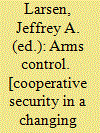

|
|
|
|
|
| Publication |
New Delhi, Viva Book Publisher, 2005.
|
| Description |
xviii, 413p.
|
| Standard Number |
8130900807
|
|
|
|
|
|
|
|
|
|
|
|
Copies: C:1/I:0,R:0,Q:0
Circulation
| Accession# | Call# | Current Location | Status | Policy | Location |
| 049653 | 327.174/LAR 049653 | Main | On Shelf | General | |
|
|
|
|
| 2 |
ID:
152945
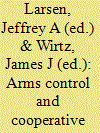

|
|
|
|
|
| Publication |
New Delhi, Viva Books, 2011.
|
| Description |
xiv, 288p.hbk
|
| Standard Number |
9788130915302
|
|
|
|
|
|
|
|
|
|
|
|
Copies: C:1/I:0,R:0,Q:0
Circulation
| Accession# | Call# | Current Location | Status | Policy | Location |
| 059059 | 355.02/LAR 059059 | Main | On Shelf | General | |
|
|
|
|
| 3 |
ID:
067312


|
|
|
| 4 |
ID:
050152
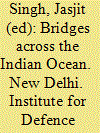

|
|
|
|
|
| Publication |
New Delhi, Institute for Defence Studies and Analysis, 1997.
|
| Description |
227p.Paperback
|
|
|
|
|
|
|
|
|
|
|
|
Copies: C:1/I:0,R:0,Q:0
Circulation
| Accession# | Call# | Current Location | Status | Policy | Location |
| 039148 | 551.467/SIN 039148 | Main | On Shelf | General | |
|
|
|
|
| 5 |
ID:
052131


|
|
|
|
|
| Publication |
New Delhi, IDSA, 1997.
|
| Description |
227p.
|
|
|
|
|
|
|
|
|
|
|
|
Copies: C:1/I:0,R:0,Q:0
Circulation
| Accession# | Call# | Current Location | Status | Policy | Location |
| 039149 | 551.467/SIN 039149 | Main | On Shelf | General | |
|
|
|
|
| 6 |
ID:
113855


|
|
|
|
|
| Publication |
2012.
|
| Summary/Abstract |
Major powers are frequently urged to embrace grand strategies tied to particular International Relations theories. In the case of United States foreign policy, scholars generally analyse a well-known set of strategic choices - primacy, selective engagement, offshore balancing, collective security and cooperative security - favoured by relatively mainstream realist and liberal thinkers in International Relations. This article explores the evolution of cooperative security as an idea from its clear ties to liberal and neoliberal international relations theory to its current understanding in world politics, which is surprisingly consistent with many emancipatory ideals of critical International Relations theory. Cooperative security no longer merely implies multilateralism, negotiation and arms control. Rather, security is now more frequently described as indivisible, and genuine cooperation is said to require shared decision-making and consensual practices. Non-governmental organisations are more and more granted a voice in security discussions, as are international institutions. While weapons and warfare remain important security concerns, the cooperative security agenda today includes ideas associated with human security, including environmental calamity, global inequality and hunger.
|
|
|
|
|
|
|
|
|
|
|
|
|
|
|
|
| 7 |
ID:
057822
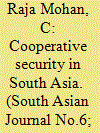

|
|
|
|
|
| Publication |
Oct-Dec 2004.
|
|
|
|
|
|
|
|
|
|
|
|
|
|
|
|
| 8 |
ID:
019839
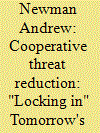

|
|
|
|
|
| Publication |
April 2001.
|
| Description |
83-106
|
|
|
|
|
|
|
|
|
|
|
|
|
|
|
|
| 9 |
ID:
097127


|
|
|
|
|
| Publication |
2010.
|
| Summary/Abstract |
The article challenges the view that democratisation is a recipe for regional disorder in East Asia. This view is not supported by evidence. Critics of democratisation fail to consider a number of mitigating factors that may check the destabilising consequences of democratisation while accentuating its peace-causing effects. These factors are not necessarily other liberal forces, like economic interdependence, or regional institutions, although these do matter. Certain dynamics associated with democratisation, such as focus on economic rebuilding for regime legitimation, positive nationalism ('democratic pride'), involvement of civil society, etc., may lessen the potential for inter-state conflict. These mitigating factors do not necessarily correspond with the normative and institutionalist logic underpinning the democratic peace theory, and they have been largely overlooked by the critics of that theory. After identifying them, this paper shows that the East Asian experience does not show that democratisation leads to greater conflict between states. On the contrary, democratisation might create better prospects for cooperative peace in the region.
|
|
|
|
|
|
|
|
|
|
|
|
|
|
|
|
| 10 |
ID:
068522
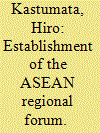

|
|
|
| 11 |
ID:
114926
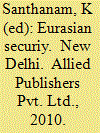

|
|
|
|
|
| Publication |
New Delhi, Allied publishers Pvt. Ltd., 2010.
|
| Description |
xx,159p.
|
| Standard Number |
9788184246414
|
|
|
|
|
|
|
|
|
|
|
|
Copies: C:1/I:0,R:0,Q:0
Circulation
| Accession# | Call# | Current Location | Status | Policy | Location |
| 056803 | 355.00958/SAN 056803 | Main | On Shelf | General | |
|
|
|
|
| 12 |
ID:
101010
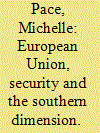

|
|
|
|
|
| Publication |
2010.
|
| Summary/Abstract |
With the coming into force of the Euro-Mediterranean Partnership, the European Union (EU) annunciated what one could term an 'inclusionist approach' to security whereby this policy framework was based on supposedly joint commitments by all parties concerned to 'cooperative security'. However, EU actions on the ground in the south have shown that, despite good intentions, such cooperative security endeavours have, thus far, hardly materialised. The result instead is an 'exclusionist' policy, where the reduction of illegal migration from the south takes top priority in EU security discourse. Post-9/11, in the policy area of 'counter-terrorism' measures, the EU likewise demarcates 'liberal zones of civilisation' from 'illiberal' ones, leaving the dirty work of counter terrorism to countries such as Egypt and Morocco. In terms of governmentality, this may be described as a 'surveillance and control' approach to security: therefore, it is argued here that the EU, through its governance model, is actually enabling further in-security and in-stability in the south.
|
|
|
|
|
|
|
|
|
|
|
|
|
|
|
|
| 13 |
ID:
023090


|
|
|
|
|
| Publication |
2002.
|
| Description |
167-200
|
|
|
|
|
|
|
|
|
|
|
|
|
|
|
|
| 14 |
ID:
006371


|
|
|
|
|
| Publication |
Washington, D C, Brookings Institution, 1994.
|
| Description |
xvi, 623p.
|
| Standard Number |
0815760973
|
|
|
|
|
|
|
|
|
|
|
|
Copies: C:1/I:0,R:0,Q:0
Circulation
| Accession# | Call# | Current Location | Status | Policy | Location |
| 037294 | 327.17/NOL 037294 | Main | On Shelf | General | |
|
|
|
|
| 15 |
ID:
080337


|
|
|
|
|
| Publication |
2007.
|
| Summary/Abstract |
Missile defenses have become a source of controversy between the United States and Russia, out of proportion to their technological capabilities and in negligence of strategic and political realities. Cooler heads should prevail. U.S. or other national missile defenses will not abolish mutual deterrence based on assured retaliation. In addition, whether defenses support or undermine deterrence is a question of political intent, not of technology determinism. U.S. missile defenses deployed in Europe, for example, might be provocateurs of Russian distrust or they might be instruments of collaborative research and development under a regime of cooperative security.
|
|
|
|
|
|
|
|
|
|
|
|
|
|
|
|
| 16 |
ID:
051782
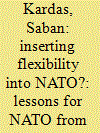

|
|
|
|
|
| Publication |
Sep-Nov 2003.
|
|
|
|
|
|
|
|
|
|
|
|
|
|
|
|
| 17 |
ID:
070635


|
|
|
| 18 |
ID:
090678
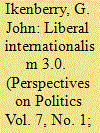

|
|
|
|
|
| Publication |
2009.
|
| Summary/Abstract |
Liberal international order-both its ideas and real-world political formations-is not embodied in a fixed set of principles or practices. Open markets, international institutions, cooperative security, democratic community, progressive change, collective problem solving, the rule of law-these are aspects of the liberal vision that have made appearances in various combinations and changing ways over the last century. I argue that it is possible to identify three versions or models of liberal international order-versions 1.0, 2.0, and 3.0. The first is associated with the ideas of Woodrow Wilson, the second is the Cold War liberal internationalism of the post-1945 decades, and the third version is a sort of post-hegemonic liberal internationalism that has only partially appeared and whose full shape and logic is still uncertain. I develop a set of dimensions that allow for identifying different logics of liberal international order and identify variables that will shape the movement from liberal internationalism 2.0 to 3.0.
|
|
|
|
|
|
|
|
|
|
|
|
|
|
|
|
| 19 |
ID:
061940


|
|
|
|
|
| Publication |
Apr-Jun 2005.
|
|
|
|
|
|
|
|
|
|
|
|
|
|
|
|
| 20 |
ID:
057215


|
|
|
|
|
|
|
|